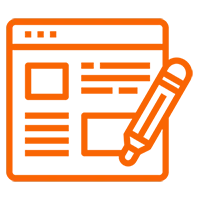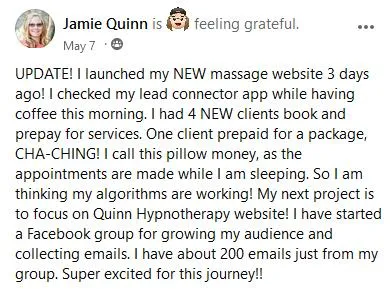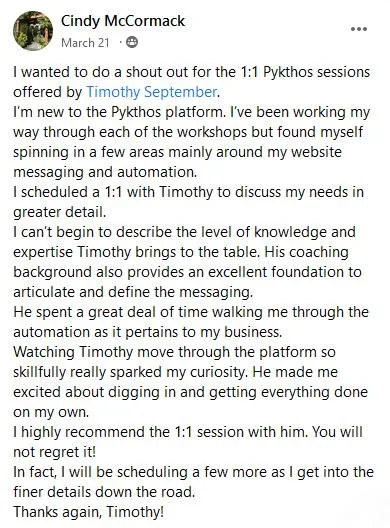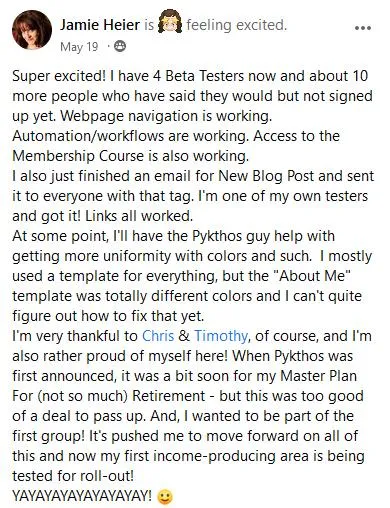Get your 7-Step framework to create a thriving business for FREE
Just fill out the form and we'll send it to you

Blogs

The Hypnotherapist's Guide to Pricing with Confidence (Even If You Feel Like a Fraud)
The Hypnotherapist's Guide to Pricing with Confidence (Even If You Feel Like a Fraud)
By Timothy September

I was sitting across from a hypnosis role model everyone should aspire to be, Ryan Montis, sweating bullets.
"I just can't bring myself to charge more than $75 per session," I confessed, staring down at my coffee.
He leaned back in his chair and asked, "So you're telling me that helping someone overcome a lifelong problem in three sessions is worth less than what they'd pay for a decent dinner and a movie?"
That question hit me like a ton of bricks.
I'd been a certified hypnotherapist for nearly two years at that point.
I'd helped dozens of clients overcome significant challenges – smoking cessation, anxiety, weight issues – yet I was still charging rates that barely covered my office rent.
Why? Because deep down, I felt like a fraud.
Sound familiar?
The Uncomfortable Truth About Undercharging
Inside the Pykthos Mastermind, we see this pattern constantly.
Skilled practitioners charging bargain-basement rates while delivering premium transformations.
Yeah. We see you!
The work you do is incredible!
And the stories we’ve heard about near-miraculous transformations in just a session or two are all the proof you need.
Clients often come to you as their last resort.
How often do you hear something like, “I’ve tried everything to fix this…” or “I’ve seen nearly every specialist for this…”?
It isn’t uncommon in our industry.
What we do is different.
So it requires a different approach and mindset around it.
Here's what most hypnotherapists don't realize: undercharging isn't just hurting you – it's actively harming your clients.
When you undercharge:
You attract price-shopping clients who value cost over transformation (and who are typically harder to work with)
You unconsciously devalue your own work, which affects your presence and confidence in session
You create less commitment from your clients, leading to more no-shows and less follow-through
You burn out faster because you need more clients to make ends meet
You reinforce the public perception that hypnotherapy isn't "real therapy"
One of our Mastermind members, David, put it perfectly: "I was charging $60 per session because I was afraid no one would pay more. Then I realized my clients weren't taking their homework seriously. They'd cancel at the last minute. I was essentially telling them my work wasn't that valuable."
After we helped David raise his rates to $350 per session, something remarkable happened.
His no-show rate dropped from 30% to less than 5%.
His clients started doing their between-session work.
His results improved dramatically. The higher price created higher commitment.
It also started bringing higher-quality clients.
Now? He’s charging $500 a session and thinking about moving it up to $750.
He’s found that having to do fewer sessions to make ends meet is actually helping him make more.
Want to see this for yourself?

The Math Your Practice Deserves
Let's get practical for a moment.
Many hypnotherapists make the mistake of looking at what others charge and picking a number that feels "safe." That's backward thinking.
Instead, work backward from your desired income.
Here's a simple formula to start with:
Decide how much you want to make annually (let's say $80,000)
Determine how many sessions you can reasonably do per week without burning out (maybe 15-20)
Account for vacation time, sick days, and holidays (let's say 45 working weeks)
Do the math: $80,000 ÷ 45 weeks = $1777 needed per week
Take the amount per week ÷ your 15 - 20 sessions = $88 - $118 per session minimum
But that's just the financial baseline. This isn’t even taking into account business expenses or taxes.
If you include those, after it's all said and done? You need to make at least an additional 45% to fill the gap.
Suddenly $80,000 turns into needing to make $116,000 to be "ok".
And your 15-20 client burn-out threshold? That now becomes a 20 - 30 client burden at the $88 - $118 per session.
How is it a burden? Don't forget, in order to keep a constant 20 - 30 clients a week, you probably do some type of consultation or discovery call.
And how many discovery calls do you need to do to cover this ever-rotating client base?
Consider most close rates are 25% - 50%. That means, at least double the amount of people who pay.
Now, your 20 - 30 hours of client work is in all reality 40 - 60 hours.
Worst off, that's ONLY meetings. EACH WEEK!
So do you see how this mindset of "just charge as little as I can" is more-so damaging than it is helpful?
Nor does it account for your real value: transformation.

Pricing Based on Transformation, Not Time
Here's where most practitioners go wrong.
They price based on time rather than transformation.
In business there are only 4 ways you can compete in the marketplace:
Make your product better than your competitors.
Your product gives faster results than your competitors.
Make your product cheaper than your competitors and drive the price down.
Your product is easier to use or understand than your competitors.
A traditional therapist might charge $150 per weekly session, with clients coming for months or years. That's pricing based on time.
But hypnotherapists often create profound change in just 3-6 sessions.
We're not selling hours – we're selling faster results, easier, better (objectively), and cheaper over the long term.
Consider these questions:
What is it worth to a client to overcome a lifelong phobia?
What would someone pay to finally quit smoking for good?
What's the value of being free from anxiety attacks that have limited someone's life for decades?
The answers to these questions should inform your pricing far more than "what's the going rate in my area."
One of our Mastermind members, Stephanie, shifted from charging $125 per hour to offering a "Freedom from Anxiety" package at $1,500 for three sessions. Her client acquisition actually increased because she was selling a specific outcome rather than time.

In the Pykthos Mastermind, we use the Brand Messaging Blueprint to help practitioners articulate their unique value proposition and price accordingly.
And once you have that nailed down, it makes sense to both you and your client on what they are getting and how it’ll benefit them.
Now, honestly not every potential client will be 100% ready to say “yes” to those kinds of prices.
So, let’s talk about it.
The "That's Expensive" Objection (And How to Handle It)
Let's address the elephant in the room – what do you say when a potential client says, "That's more than I expected to pay"?
First, recognize that price objections are rarely about the actual number. They're about perceived value.
When someone objects to your prices, what they're really saying is, "I don't yet understand the value of what you're offering."
Here's a simple three-step framework you can use to reframe their objection that I learned from Bill Walsh:
Step 1: Validate their concern
"I completely understand – investing in yourself is a big decision."
Step 2: Reframe from cost to value
"May I ask you something? How long have you been dealing with this issue, and what has it cost you in terms of opportunities, happiness, or even money spent on temporary solutions?"
Step 3: Return to transformation
"What I've found is that clients who commit to the full process experience [specific transformation]. Is that outcome worth the investment to you?"
This approach works because it helps potential clients shift their perspective from the immediate price tag to the long-term value of the transformation you're offering.
Sarah, one of our members, shared this story: "A client objected to my $750 smoking cessation package until I asked how much she spent on cigarettes each month. When she calculated it was over $300, plus the health costs down the road, my fee suddenly seemed like a bargain."
Again, the fastest way for potential clients to turn into ready to invest right now is pretty simple.
Make it easy for them to know what they are investing in.

Psychological Triggers That Support Premium Pricing
Beyond handling objections, there are several psychological triggers you can ethically use to help clients commit to premium prices:
1. The Contrast Principle
Always provide context for your pricing. If you offer a package at $1,200, mention that similar transformations in traditional therapy might take a year at $150 per week (over $7,000).
2. Future Pacing
Help clients vividly imagine their life after working with you. "Imagine waking up six weeks from now, and this issue that's been plaguing you for years is just... gone. What would that be worth to you?"
3. Social Proof
Share specific client success stories (with permission). "Julie came to me after spending over $3,000 on methods that didn't work. After our six sessions, she was finally free from her fear of flying and took her dream vacation to Italy."
4. Scarcity (When Authentic)
If you truly can only take a limited number of clients, say so. "Because I give each client my full attention, I only work with 15 clients at a time. I currently have two openings this month."
5. Tangible Results
Where possible, quantify the results. "85% of my weight management clients maintain their results after one year, compared to the national average of less than 20% for diet programs."
These aren't manipulative tactics – they're ways to help clients understand the true value of what you're offering and make informed decisions.
Think about it. When YOU are shopping for a product:
Do you see if anybody else offers something similar for less?
Do you think about what your future might be once you have it?
How often do you read the reviews before buying?
When something you really want is only available for a limited time, do you get it?
When looking at reviews, do you see who’s successfully used the product and who’s failed?
If you said yes to any of these questions, congratulations!
That means your brain is working like the 99.9% of the rest of us.
So, yes, these psychological triggers are happening all the time - even with your customer.
When and How to Raise Your Rates with Integrity
Perhaps you're already established but know you're undercharging. How do you raise rates without alienating existing clients?
We recommend this approach:
1. Give Advance Notice
Provide at least 30-60 days' notice before implementing new rates.
2. Grandfather Existing Clients (Temporarily)
Let current clients keep their current rate for a set period (3-6 months) before transitioning to the new rate.
3. Communicate Value, Not Apologize
Never apologize for raising your rates. Instead, frame it positively: "As my practice has evolved and I've developed new techniques, I'm updating my fee structure to reflect the depth of transformation I now provide."
4. Consider a Tiered Approach
Raise rates for new clients first, then gradually bring existing clients to the new rate over time.
5. Add Value When Possible
If appropriate, add something to justify the increase – perhaps additional support materials, a follow-up session, or access to a recorded hypnosis audio.
Monica, a Mastermind member, was charging $90 per session and wanted to increase to $300. She sent a warm email to existing clients explaining that her rates for new clients would be $300 starting in 30 days, but they could lock in 5 sessions at $150 per session if purchased within that window.
Most clients bought packages, and she successfully transitioned to her new rate structure.
New clients had no issue paying $300 a session.
Old clients had an opportunity to still get a nice deal…
And Monica ended up making more money while working less.
Best of all, her old clients even agreed she was under selling what she was really worth.
The Confidence-Competence Loop
Here's something powerful I've observed: raising your rates actually makes you a better hypnotherapist.
When you charge premium rates, you:
Take yourself more seriously
Invest more in your continuing education
Prepare more thoroughly for each client
Set clearer boundaries around your time and energy
Attract clients who are more committed to the process
Think of it like a "confidence-competence loop" – as your confidence increases, so does your competence, which further boosts your confidence.

It's not just about the money. It's about stepping fully into your professional identity and the value you provide.
And I get it, doing this whole “new year, new me” on how you promote your rates can feel overwhelming.
Shifting your identity doesn’t happen overnight. That’s actually ideal.
You want to make incremental changes throughout your day that compound into big changes over a longer period of time.
So what do you do?
Start Where You Are
If you're still feeling resistant to charging what you're worth, start with a small step.
Could you raise your rates by just 15% this month? That's often small enough not to trigger massive resistance but significant enough to start shifting your mindset.
If you charge $100 a session now, make it $115. What do you notice is different?
Start noticing these small changes and see what difference it makes.
Inside the Pykthos Mastermind, we help practitioners implement the Perfect Client Snapshot to deeply understand their ideal clients' value perception. This framework gives you clarity about exactly who you serve best and how to price your services for that specific audience.
Remember, your pricing isn't just a business decision – it's a statement about the value of your work and the transformation you create.
And that can start as soon as today.
Moving Forward with Confidence
The truth is, there will always be cheaper options available to potential clients. But people who are serious about transformation aren't looking for the cheapest option – they're looking for the right solution.
Your job isn't to be the least expensive hypnotherapist in town. Your job is to be so good, so confident, and so transformative that your clients feel they received far more value than what they paid.
In the Pykthos Mastermind, we don't just talk about pricing theory – we give you the platform and tools, templates and processes, and community support full of people just like you implementing these changes in your practice.
As a member, you get access to:
The Pykthos Platform with everything you need to run a professional practice
The Pykthos Growth System which includes:
The Brand Messaging Blueprint to articulate your unique value
The Perfect Client Snapshot to understand what your ideal clients really want
And much more.
Weekly coaching calls where we tackle pricing challenges head-on
A community of practitioners who understand the journey you're on
Custom built AI tools that help you do everything from writing great website content to helping you talk through your price strategy.
This is exactly the kind of work we do together in the Mastermind. If raising your rates and charging what you're worth sounds like exactly what you need, you'd probably love the support we provide.
Click here to see what the Mastermind is all about.
Remember: Every time you discount your rates, you're discounting your impact.
Your work changes lives. Price it accordingly.
Timothy September
Co-Founder / Team Pykthos

The Hypnotherapist's Guide to Pricing with Confidence (Even If You Feel Like a Fraud)
The Hypnotherapist's Guide to Pricing with Confidence (Even If You Feel Like a Fraud)
By Timothy September

I was sitting across from a hypnosis role model everyone should aspire to be, Ryan Montis, sweating bullets.
"I just can't bring myself to charge more than $75 per session," I confessed, staring down at my coffee.
He leaned back in his chair and asked, "So you're telling me that helping someone overcome a lifelong problem in three sessions is worth less than what they'd pay for a decent dinner and a movie?"
That question hit me like a ton of bricks.
I'd been a certified hypnotherapist for nearly two years at that point.
I'd helped dozens of clients overcome significant challenges – smoking cessation, anxiety, weight issues – yet I was still charging rates that barely covered my office rent.
Why? Because deep down, I felt like a fraud.
Sound familiar?
The Uncomfortable Truth About Undercharging
Inside the Pykthos Mastermind, we see this pattern constantly.
Skilled practitioners charging bargain-basement rates while delivering premium transformations.
Yeah. We see you!
The work you do is incredible!
And the stories we’ve heard about near-miraculous transformations in just a session or two are all the proof you need.
Clients often come to you as their last resort.
How often do you hear something like, “I’ve tried everything to fix this…” or “I’ve seen nearly every specialist for this…”?
It isn’t uncommon in our industry.
What we do is different.
So it requires a different approach and mindset around it.
Here's what most hypnotherapists don't realize: undercharging isn't just hurting you – it's actively harming your clients.
When you undercharge:
You attract price-shopping clients who value cost over transformation (and who are typically harder to work with)
You unconsciously devalue your own work, which affects your presence and confidence in session
You create less commitment from your clients, leading to more no-shows and less follow-through
You burn out faster because you need more clients to make ends meet
You reinforce the public perception that hypnotherapy isn't "real therapy"
One of our Mastermind members, David, put it perfectly: "I was charging $60 per session because I was afraid no one would pay more. Then I realized my clients weren't taking their homework seriously. They'd cancel at the last minute. I was essentially telling them my work wasn't that valuable."
After we helped David raise his rates to $350 per session, something remarkable happened.
His no-show rate dropped from 30% to less than 5%.
His clients started doing their between-session work.
His results improved dramatically. The higher price created higher commitment.
It also started bringing higher-quality clients.
Now? He’s charging $500 a session and thinking about moving it up to $750.
He’s found that having to do fewer sessions to make ends meet is actually helping him make more.
Want to see this for yourself?

The Math Your Practice Deserves
Let's get practical for a moment.
Many hypnotherapists make the mistake of looking at what others charge and picking a number that feels "safe." That's backward thinking.
Instead, work backward from your desired income.
Here's a simple formula to start with:
Decide how much you want to make annually (let's say $80,000)
Determine how many sessions you can reasonably do per week without burning out (maybe 15-20)
Account for vacation time, sick days, and holidays (let's say 45 working weeks)
Do the math: $80,000 ÷ 45 weeks = $1777 needed per week
Take the amount per week ÷ your 15 - 20 sessions = $88 - $118 per session minimum
But that's just the financial baseline. This isn’t even taking into account business expenses or taxes.
If you include those, after it's all said and done? You need to make at least an additional 45% to fill the gap.
Suddenly $80,000 turns into needing to make $116,000 to be "ok".
And your 15-20 client burn-out threshold? That now becomes a 20 - 30 client burden at the $88 - $118 per session.
How is it a burden? Don't forget, in order to keep a constant 20 - 30 clients a week, you probably do some type of consultation or discovery call.
And how many discovery calls do you need to do to cover this ever-rotating client base?
Consider most close rates are 25% - 50%. That means, at least double the amount of people who pay.
Now, your 20 - 30 hours of client work is in all reality 40 - 60 hours.
Worst off, that's ONLY meetings. EACH WEEK!
So do you see how this mindset of "just charge as little as I can" is more-so damaging than it is helpful?
Nor does it account for your real value: transformation.

Pricing Based on Transformation, Not Time
Here's where most practitioners go wrong.
They price based on time rather than transformation.
In business there are only 4 ways you can compete in the marketplace:
Make your product better than your competitors.
Your product gives faster results than your competitors.
Make your product cheaper than your competitors and drive the price down.
Your product is easier to use or understand than your competitors.
A traditional therapist might charge $150 per weekly session, with clients coming for months or years. That's pricing based on time.
But hypnotherapists often create profound change in just 3-6 sessions.
We're not selling hours – we're selling faster results, easier, better (objectively), and cheaper over the long term.
Consider these questions:
What is it worth to a client to overcome a lifelong phobia?
What would someone pay to finally quit smoking for good?
What's the value of being free from anxiety attacks that have limited someone's life for decades?
The answers to these questions should inform your pricing far more than "what's the going rate in my area."
One of our Mastermind members, Stephanie, shifted from charging $125 per hour to offering a "Freedom from Anxiety" package at $1,500 for three sessions. Her client acquisition actually increased because she was selling a specific outcome rather than time.

In the Pykthos Mastermind, we use the Brand Messaging Blueprint to help practitioners articulate their unique value proposition and price accordingly.
And once you have that nailed down, it makes sense to both you and your client on what they are getting and how it’ll benefit them.
Now, honestly not every potential client will be 100% ready to say “yes” to those kinds of prices.
So, let’s talk about it.
The "That's Expensive" Objection (And How to Handle It)
Let's address the elephant in the room – what do you say when a potential client says, "That's more than I expected to pay"?
First, recognize that price objections are rarely about the actual number. They're about perceived value.
When someone objects to your prices, what they're really saying is, "I don't yet understand the value of what you're offering."
Here's a simple three-step framework you can use to reframe their objection that I learned from Bill Walsh:
Step 1: Validate their concern
"I completely understand – investing in yourself is a big decision."
Step 2: Reframe from cost to value
"May I ask you something? How long have you been dealing with this issue, and what has it cost you in terms of opportunities, happiness, or even money spent on temporary solutions?"
Step 3: Return to transformation
"What I've found is that clients who commit to the full process experience [specific transformation]. Is that outcome worth the investment to you?"
This approach works because it helps potential clients shift their perspective from the immediate price tag to the long-term value of the transformation you're offering.
Sarah, one of our members, shared this story: "A client objected to my $750 smoking cessation package until I asked how much she spent on cigarettes each month. When she calculated it was over $300, plus the health costs down the road, my fee suddenly seemed like a bargain."
Again, the fastest way for potential clients to turn into ready to invest right now is pretty simple.
Make it easy for them to know what they are investing in.

Psychological Triggers That Support Premium Pricing
Beyond handling objections, there are several psychological triggers you can ethically use to help clients commit to premium prices:
1. The Contrast Principle
Always provide context for your pricing. If you offer a package at $1,200, mention that similar transformations in traditional therapy might take a year at $150 per week (over $7,000).
2. Future Pacing
Help clients vividly imagine their life after working with you. "Imagine waking up six weeks from now, and this issue that's been plaguing you for years is just... gone. What would that be worth to you?"
3. Social Proof
Share specific client success stories (with permission). "Julie came to me after spending over $3,000 on methods that didn't work. After our six sessions, she was finally free from her fear of flying and took her dream vacation to Italy."
4. Scarcity (When Authentic)
If you truly can only take a limited number of clients, say so. "Because I give each client my full attention, I only work with 15 clients at a time. I currently have two openings this month."
5. Tangible Results
Where possible, quantify the results. "85% of my weight management clients maintain their results after one year, compared to the national average of less than 20% for diet programs."
These aren't manipulative tactics – they're ways to help clients understand the true value of what you're offering and make informed decisions.
Think about it. When YOU are shopping for a product:
Do you see if anybody else offers something similar for less?
Do you think about what your future might be once you have it?
How often do you read the reviews before buying?
When something you really want is only available for a limited time, do you get it?
When looking at reviews, do you see who’s successfully used the product and who’s failed?
If you said yes to any of these questions, congratulations!
That means your brain is working like the 99.9% of the rest of us.
So, yes, these psychological triggers are happening all the time - even with your customer.
When and How to Raise Your Rates with Integrity
Perhaps you're already established but know you're undercharging. How do you raise rates without alienating existing clients?
We recommend this approach:
1. Give Advance Notice
Provide at least 30-60 days' notice before implementing new rates.
2. Grandfather Existing Clients (Temporarily)
Let current clients keep their current rate for a set period (3-6 months) before transitioning to the new rate.
3. Communicate Value, Not Apologize
Never apologize for raising your rates. Instead, frame it positively: "As my practice has evolved and I've developed new techniques, I'm updating my fee structure to reflect the depth of transformation I now provide."
4. Consider a Tiered Approach
Raise rates for new clients first, then gradually bring existing clients to the new rate over time.
5. Add Value When Possible
If appropriate, add something to justify the increase – perhaps additional support materials, a follow-up session, or access to a recorded hypnosis audio.
Monica, a Mastermind member, was charging $90 per session and wanted to increase to $300. She sent a warm email to existing clients explaining that her rates for new clients would be $300 starting in 30 days, but they could lock in 5 sessions at $150 per session if purchased within that window.
Most clients bought packages, and she successfully transitioned to her new rate structure.
New clients had no issue paying $300 a session.
Old clients had an opportunity to still get a nice deal…
And Monica ended up making more money while working less.
Best of all, her old clients even agreed she was under selling what she was really worth.
The Confidence-Competence Loop
Here's something powerful I've observed: raising your rates actually makes you a better hypnotherapist.
When you charge premium rates, you:
Take yourself more seriously
Invest more in your continuing education
Prepare more thoroughly for each client
Set clearer boundaries around your time and energy
Attract clients who are more committed to the process
Think of it like a "confidence-competence loop" – as your confidence increases, so does your competence, which further boosts your confidence.

It's not just about the money. It's about stepping fully into your professional identity and the value you provide.
And I get it, doing this whole “new year, new me” on how you promote your rates can feel overwhelming.
Shifting your identity doesn’t happen overnight. That’s actually ideal.
You want to make incremental changes throughout your day that compound into big changes over a longer period of time.
So what do you do?
Start Where You Are
If you're still feeling resistant to charging what you're worth, start with a small step.
Could you raise your rates by just 15% this month? That's often small enough not to trigger massive resistance but significant enough to start shifting your mindset.
If you charge $100 a session now, make it $115. What do you notice is different?
Start noticing these small changes and see what difference it makes.
Inside the Pykthos Mastermind, we help practitioners implement the Perfect Client Snapshot to deeply understand their ideal clients' value perception. This framework gives you clarity about exactly who you serve best and how to price your services for that specific audience.
Remember, your pricing isn't just a business decision – it's a statement about the value of your work and the transformation you create.
And that can start as soon as today.
Moving Forward with Confidence
The truth is, there will always be cheaper options available to potential clients. But people who are serious about transformation aren't looking for the cheapest option – they're looking for the right solution.
Your job isn't to be the least expensive hypnotherapist in town. Your job is to be so good, so confident, and so transformative that your clients feel they received far more value than what they paid.
In the Pykthos Mastermind, we don't just talk about pricing theory – we give you the platform and tools, templates and processes, and community support full of people just like you implementing these changes in your practice.
As a member, you get access to:
The Pykthos Platform with everything you need to run a professional practice
The Pykthos Growth System which includes:
The Brand Messaging Blueprint to articulate your unique value
The Perfect Client Snapshot to understand what your ideal clients really want
And much more.
Weekly coaching calls where we tackle pricing challenges head-on
A community of practitioners who understand the journey you're on
Custom built AI tools that help you do everything from writing great website content to helping you talk through your price strategy.
This is exactly the kind of work we do together in the Mastermind. If raising your rates and charging what you're worth sounds like exactly what you need, you'd probably love the support we provide.
Click here to see what the Mastermind is all about.
Remember: Every time you discount your rates, you're discounting your impact.
Your work changes lives. Price it accordingly.
Timothy September
Co-Founder / Team Pykthos

Media Mentions

Jamie Quinn


Cindy McCormack


Jamie Heier


COMPANY
CUSTOMER CARE
LEGAL
FOLLOW US
Copyright 2025. Pykthos. All Rights Reserved.

